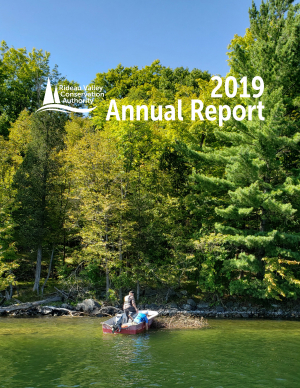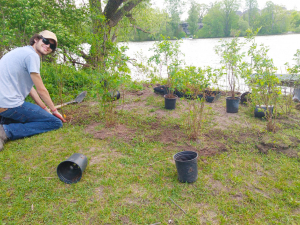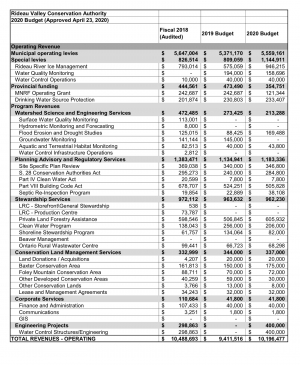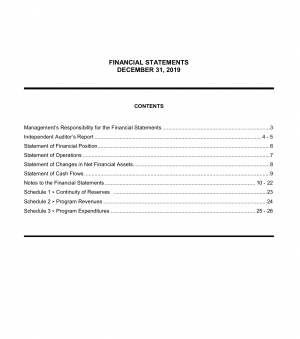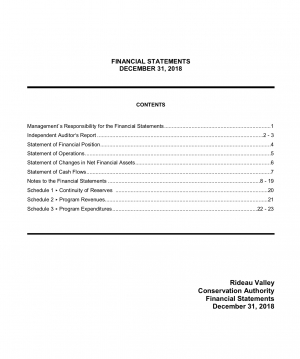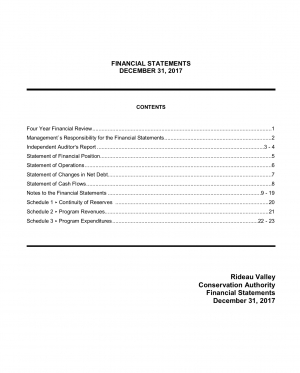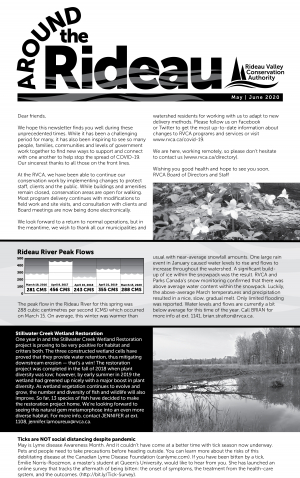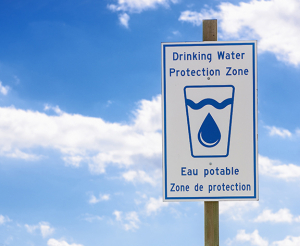Super User
Minor Low Water Conditions in Rideau Valley Watershed
June 4, 2020 – Due to below average rainfall in April and May, conditions in the Rideau Valley Watershed now meet the threshold for Minor Low Water status under the Ontario Low Water Response Program. Watershed residents and businesses are encouraged to conserve water during dry conditions.
Although stream flow values are not currently below any of the low water thresholds, the stream flow values are lower than normal by as much as 30 to 50 percent and field observations indicate that ecological conditions are becoming stressed. The average 90-day rainfall measured at climate stations in and around the watershed is just shy of 80 per cent of normal for this time of year, which is a key indicator for Minor Low Water status. In the past 30 days, average rainfall is slightly below 50 per cent of normal. Looking ahead, the seven-day weather forecast suggests we will continue to receive minimal precipitation.
Following an early spring freshet this year, Parks Canada are closely monitoring the water levels throughout the Rideau Canal system inside the Rideau Valley watershed. Water levels in the reservoir lakes are currently close to normal but are expected to decline with little precipitation in the short-term forecast. Rideau River flows downstream of Big Rideau Lake have been reduced to minimum. Water levels in the Rideau River below Smiths Falls are within navigable ranges.
Conservation Authority staff continue to monitor conditions and communicate with water managers throughout the watershed. Updates to this message will be issued as conditions warrant.
-end-
"Rideau Valley Conservation Authority is a partnership of municipalities within the Rideau Valley watershed created under the Conservation Authorities Act to deliver a range of programs in watershed management and natural resource conservation."
100,000 Shoreline Plants!
OTTAWA, May 29, 2020 — RVCA’s Shoreline Naturalization Program has reached a milestone — this spring they planted their 100,000th shoreline plant.
The Shoreline Naturalization Program was established in 2009 to help shoreline landowners and groups create natural, resilient shoreline buffers that protect property from erosion, provide critical wildlife habitat and, improve water quality. The program is geared to waterfront landowners who have wetlands, streams, rivers, and lakes within the Rideau Valley watershed. Lake associations, not-for-profits, and stream/creek/river groups are eligible as well.
‘It's been great seeing the program grow over the years. More and more people realize the importance of maintaining natural shoreline buffers. It shows every year with the number of calls we get,” says Meaghan McDonald, RVCA’s Lake Planning/Shoreline Stewardship Coordinator.
There are a lot of benefits to naturalizing your shoreline. Shoreline plants filter runoff that contains pollutants such as fertilizers, soil, road salt, vehicle fluids, pet waste and septic leachate. They improve wildlife habitat by providing food, safe travel areas and places to live. They provide shade over the water, which creates habitat and resting areas for fish. Shade cools water temperatures, which is good for many fish species. These plants are key to erosion protection. They slow erosion processes down by trapping soil in place. They control runoff. Too many soil particles in the water can be problematic for aquatic wildlife by reducing clarity, burying fish spawning grounds, clogging fish gills and limiting aquatic plant growth. A buffer of shoreline plants means less work maintaining your waterfront. All you need to do is prune to maintain your wonderful, water views. Shoreline vegetation also helps with flood abatement. The plants slow down surface water runoff and absorb it into the ground.
You can learn more about the program or sign up for a free site visit at https://www.rvca.ca/stewardship-grants/shoreline-naturalization/shoreline-naturalization-program. You will get a free site visit to discuss your individual needs. And, the program will provide you with a custom planting plan tailored to your property's specifications. And, the cost of shoreline plants is subsidized.
It’s a win-win situation — you get beautiful shoreline plantings that enhance your property and the environment benefits too.
-end-
For more information, please contact:
Meaghan McDonald
Lake Planning / Shoreline Stewardship Coordinator
Rideau Valley Conservation Authority
613-692-3571 ext. 1192
2019 RVCA Financial Statement
2018 RVCA Financial Statement
2017 RVCA Financial Statement
Remembering Walkerton
Today’s local partnerships continue to protect drinking water
Ken Graham, Chair, Mississippi-Rideau Source Protection Committee
As we deal with COVID-19, we are reminded of the value and importance of our public health system. Twenty years ago, this May, Ontarians were reeling with the news of different public health event: the Walkerton Water Tragedy. The community of Walkerton, Ontario, located north-west of Toronto with a population of less than 5,000 at the time, saw seven deaths, and 2,300 people fall ill, after breakdowns in the local water system. The drinking supply in Walkerton became contaminated by Escherichia coli and Campylobacter jejuni bacteria.
After a powerful public inquiry, it was time to respond to a tainted-water catastrophe with decisive changes in how our health system was functioning. The O’Connor Commission’s call to action resulted in changes to how drinking water was managed, including the introduction of Ontario’s Clean Water Act, 2006.
In 2007, under the Clean Water Act, Mississippi and Rideau Valley Conservation Authorities formed a local Source Protection Authority which formed a committee of multiple stakeholders — Municipalities, industry, small business, environmental interests, First Nations, agriculture and the general public — who would oversee research and the development of important source protection plans. In effect since 2015, these plans include policies that respond to local threats and help protect our municipal drinking water sources. Since day one, we have been fortunate to have municipalities, residents and businesses support the work of this local Source Protection Authority and do their part to keep our drinking water safe and clean. This work continues today.
And while May is a somber time for Walkerton and Canadians as a whole, we hope that locally we can take comfort that we have made advances through legislation and local teamwork which together are ensuring that our municipal drinking water sources are safe and abundant — now and into the future.
We remember those who lost their lives in Walkerton twenty years ago this month and we think of all the people whose health continues to be affected from that tragedy
Thank you to those in public health, environmental protection and local citizens who continue to work and advocate for safe drinking water. Together we are all part of this work to protect public health in Ontario. Let’s all do our part to keep ourselves, our families and each other safe.
----
Ken Graham is Chair of the Mississippi-Rideau Source Protection Committee. Ken served 20 years as an elected Smiths Falls Town Councillor and 11 years on the Rideau Valley Conservation Authority Board of Directors including three as Chair. Mr. Graham has also held Board of Directors positions at numerous other organizations such as the Leeds, Grenville and Lanark District Health Unit, the Smiths Falls Airport Commission, the Perth and Smiths Falls District Hospital, Smiths Falls Child Development Center and the Smiths Falls Heritage House Museum. In his professional career, Mr. Graham was a civilian employee of the Ontario Provincial Police, a Police Officer with the Smiths Falls Police Service and an Investigator with the Ontario Ministry of the Environment.



